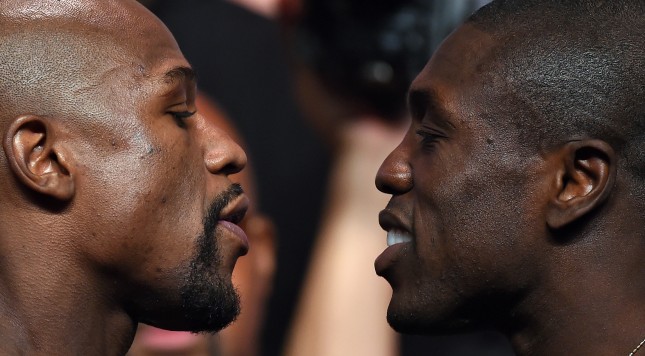The business of boxing is changing, and fast. Long-time fighter advisor turned media mogul Al Haymon is collecting fighters and broadcast deals like lesser mortals collect belly button lint.
In less than a year, the sport has gone from a few expensive channels and late nights on ESPN2 (after the tennis) to prime-time on network TV. Like a butterfly (or at least a moth), boxing seems to have emerged from its chrysalis and spread its dusty wings. The pace of change has been dizzying.
It’s comforting, then, that Floyd Mayweather’s latest fight offers something familiar: a good honest swindle. Perhaps the welterweight champion (and Haymon client) believes that in this era of flux, fight fans will seek comfort in an old-fashioned rip-off.
And make no mistake, that’s what his fight with Andre Berto on Saturday night is. It’ll cost between $50 and $75 in the US, depending on your cable provider and whether you want to watch in standard or high definition.
There’s something almost admirable about Mayweather and Haymon’s commitment to boxing’s long tradition of celebrated hoaxes. The selection of Berto as the opponent was certainly a nod to history. The Haitian muscleman is just the latest in a long line of top pugilists who never let a lack of boxing ability get in their way.
Berto has at least a little in common with Primo Carnera, the “Ambling Alp” of the 1930s, whose Herculean physique belied a shuffling incompetence in the ring. Unlike Carnera, Berto hasn’t needed the mob to fix his fights. Instead, he’s spent most of his career fighting in all-too-real mismatches for multi-million dollar pay days.
But the curious thing about “High Stakes,” as the promotion has been baptized (presumably because that’s what you’ll need to wager on Mayweather if you want to make any money), isn’t that Berto is a soft touch. It’s that no effort has been made to conceal that fact.
Usually an unscrupulous manager’s objective is to guide his fighter through a series of easy, record-padding match-ups before cashing out when a pay day big enough to justify killing the golden goose comes along. Think of Peter McNeeley, whose meticulously constructed record of 36-1 proved little help during the full one minute and 29 seconds he spent in the ring with Mike Tyson.
Berto’s goose was cooked years ago, though. The former HBO darling has lost three of his last six fights, all against opposition much less accomplished than Mayweather. Boxing fans have had serious reservations about him for more than half a decade.
There’s nothing novel about a boxing superstar taking an easy fight, either. Joe Louis was famous for his “Bum of the Month Club” and Muhammad Ali followed up The Rumble in the Jungle by fighting Chuck Wepner, the “Bayonne Bleeder”. But in the era of pay-per-view, with fans being asked to hand over their hard-earned cash, mismatches seem all the more egregious.
Of course, you can choose not to spend the money, an option that proved popular for Mayweather’s last tune-up, a 2013 fizzler with Robert Guerrero (who qualified for that opportunity by going life and death with Berto). The PPV figures for that fight are still lost somewhere between the Bermuda Triangle and the back of Showtime executive vice president Stephen Espinoza’s couch.
The only thing separating Mayweather vs Berto from the many, many high profile mismatches in boxing history has been the sheer unconvincing nature of the promotion. Traditionally, a lacklustre foe is built-up in the pre-fight hype. Guerrero, for example, was touted as a Mexican warrior and a southpaw (Floyd has trouble with southpaws, or so the adage goes).
This time round, however, it seems that nobody involved can quite stomach the idea of talking up Berto’s prospects. It’s been left to Mayweather himself to plug his opponent as a “tough competitor,” as sure a sign as any of just how unequal this match is. Even Berto has been muted.
Then there’s the talk of Mayweather retiring. Boxing fans aren’t entirely unfamiliar with half-hearted retirements—boxers who step out of the ring and stay there are more the exception than the rule.
Shane Mosley isn’t currently in the midst of an ill-advised comeback (most of them are). Sugar Ray Leonard famously retired and came back to fight Marvin Hagler before retiring again and, yes, coming back again. The list of names goes on. Mayweather himself retired in 2007, returning in 2009 to face Juan Manuel Marquez.
Efforts to brand this fight as Mayweather’s last have been unconvincing at best, however. Showtime hasn’t pursued the angle at all, perhaps because they’re keen to negotiate a new contract after Mayweather’s current six-fight deal lapses on Saturday night. Mayweather himself has been slightly more insistent that this fight will be his swansong, but if you believe that, well, I’ve got a great PPV I’d like to sell you.
The good news is that if Haymon’s PBC model succeeds in attracting advertising revenue, we’re likely to see fewer PPVs in future. There are likely big changes ahead for the sport, but they’ll come too late for Mayweather.
As for this fight, unless it’s Haymon’s dark masterpiece, a Producers-inspired scam designed to make money even as it loses it, there’s nothing new about it. Mayweather vs Berto is a con as old as boxing itself; it’s just not a particularly well-executed one.
(Photo: Mayweather and Andre Berto face off during their official weigh-in. Credit: Ethan Miller/Getty Images)

